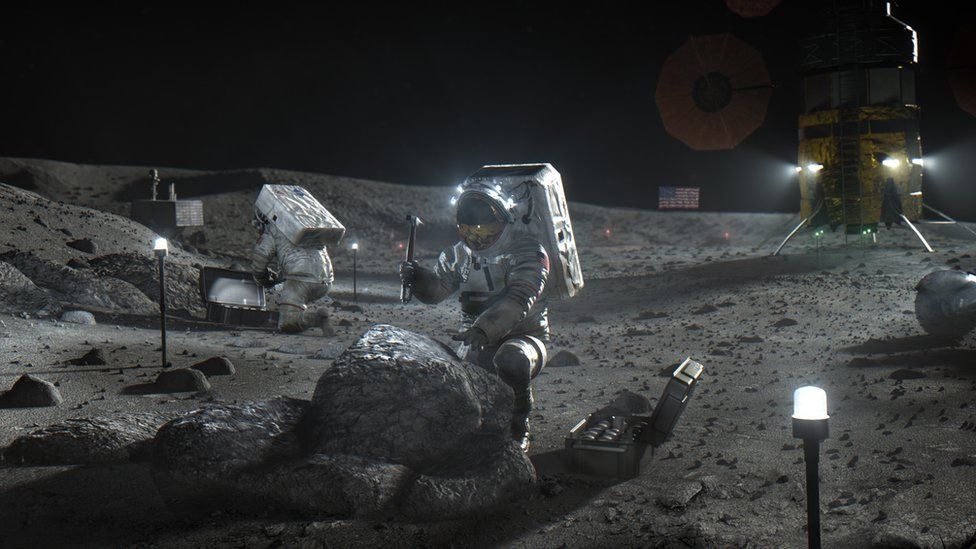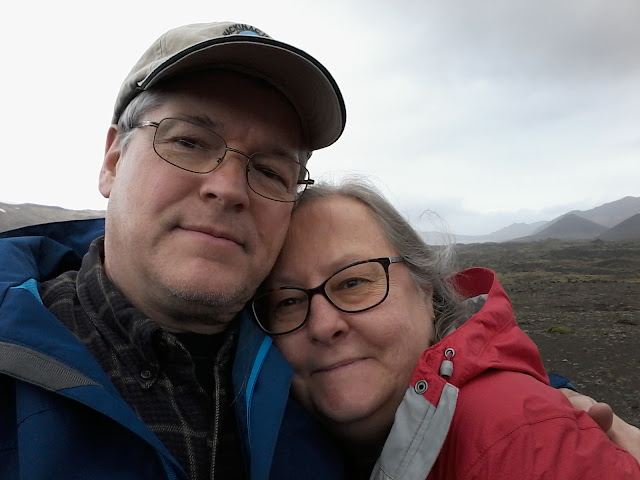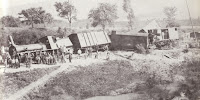I bought a Christmas tree last night. I wasn’t planning to. But as we were having dinner my son said, “Dad, you have to. A real Christmas tree this year, like Mom would have wanted.”
So after dinner I went out, and to my surprise found one—and not a Charlie Brown Christmas tree, either, but a good-looking, fresh and green Balsam fir, and at 50% off, too. I guess these things don’t see much customer demand after next weekend. Then I bought it, brought it home, we set it up in the living room, and I began to decorate it. I got perhaps a third of the way through the bin of ornaments before the emotional overload got too great and I had to put off finishing decorating it until tonight.
Karen loved Christmas, and she loved real trees. We haven’t had a real tree in a few years, ever since the cancer took away her ability to stand and decorate it. Instead, we’ve had a series of ever smaller and more pathetic artificial trees, each one looking more like a big green bottle brush than the one before. The last one came in a cardboard tube, and when pulled out of the tube sprang into form already lit and decorated. Karen didn’t love it, but at least it was sort of somewhat like a Christmas tree.
Karen had this enormous bin of Christmas ornaments, and she loved sorting through them, gently unwrapping them, and selecting the ones she wanted us to put on the tree this year. Each ornament had a story, and as she unwrapped it she’d tell us the story, even though we’d heard all her stories many times before. This ornament came from her mother. That one came from her grandmother. These were antiques, hand-blown in Poland more than a century ago. This one was made by Dan when he was in Cub Scouts. That one by Sam, when he was in Cub Scouts. Here’s the T-Rex Veronica and Bill gave us the year they decided to give everyone dinosaur cookie cutters repurposed as Christmas ornaments. These are the hand-painted German ones she got a great price on when Gimbels went out of business.
I would have given anything to have heard her tell all those stories one more time last night.
The past three and a half years were really hard on Karen. In the summer of 2019 she fractured her pelvis. Not fell, or broke, or anything like that: she’d had so many cancerous lesions pop up in her pelvic region and had received so much radiation to her pelvis, femurs, and lower spine that the bones in there just began to crack and fall apart. She went from being someone who had always been a strong, active, outdoors woman to being someone who needed a cane—then two canes—then a walker…
When her wheelchair went from being something she needed to use only when transitioning into and out of the car to being something she was completely dependent on, I think that was when she began to give up hope.

This is the last photo I took of her that she was willing to let me share. It was taken on August 27th. On August 30th she began a new course of chemo, using a new drug that had only come off the experimental list on August 5th, and no one seems to know quite what happened, but something went terribly wrong. It was as if her immune system said, “That’s it, I give up.” Her hemoglobin and platelet levels crashed. The chronic and systemic MSSA infection that we’d been fighting since July of 2021 came roaring back. My calendar for September and early October is just one long list of doctor’s appointments, diagnostic exams, treatments, infusions, transfusions, more radiation treatments, more lesions popping up in her liver, spine, and brain, more talk of possible new treatment strategies…
On October 18th, everything went to Hell in a handcart. We managed to get her bundled into the car and to the ER, where they at first thought she was having a massive cerebral hemorrhage and advised me to call the family (“and your priest, if you have one”), but later determined that she had a subdural hematoma that was putting pressure on her left temporal lobe, and transferred her to another hospital with a reputedly better neurosurgery wing. Once there they decided brain surgery would only make things worse, and while for the next few weeks she appeared to be making slow progress with medication, transfusions, and physical therapy, in early November she crashed again. Just before Thanksgiving she cleared for a few days, long enough to say goodbye, then slipped into a coma.
On Wednesday, November 30th, they sent her home, to begin in-home hospice care. I’d promised her I’d bring her home, if I could. She seemed to realize where she was and gave me a big smile.
On Saturday, December 3rd, at 5:35 p.m. she was still breathing, but her sister was having trouble with the phone app for the restaurant we were trying to order carry-out from. I turned my back on Karen for a few minutes. I wasn’t more than ten feet away from her.
When I turned back to her at 5:45 p.m., she was gone.
This is the journal she gave me for Christmas two years ago. She’d thought it would be something that would help me get back to writing again. Instead, it became our medical journal: the logbook tracking all her appointments, medications, conversations with her doctors, blood pressure, vitals, etc., etc., etc. One of her doctors got into the habit of asking me to recap what had happened in previous appointments, as I kept better and more detailed records than his clinic staff did. But I began to get worried. I was running out of blank pages. Either I was going to have to buy another journal, or…
On the day she died, there were just two blank lines left at the bottom of the last page in this book.
Karen wouldn’t want me to mope. She wouldn’t want me to be blundering around this house, wondering What do I do now? Last summer she told me she wanted me to start taking applications from women seeking the position of The Next Mrs. Bethke, so that she could interview them and pick the right one for me. I think she was kidding. She did have the gift of always being able to keep me off-balance and guessing, and the habit of saying outrageous things just to see if I was paying attention or to see what kind of reaction she’d provoke. She said I needed a woman to keep me in line.
She was wrong. I don’t need “a” woman. I need her.
But I don’t have her now, and never will again.
So tonight, I’ll finish decorating the Christmas tree, and then take some time to be mopey and sentimental. Tomorrow, I’ll start the day as has become my habit lately, with a cup of coffee and a good cry. Then, after that…
Well, I’ll figure out something. What was I doing before everything went to Hell? I’m sure I left myself some notes, somewhere around here.
In the meantime, let me leave you with this photo. In my mind’s eye she will always be that skinny, gawky, kinda nerdy girl I first met on a beach in 1969 and developed such a huge crush on—and the girl in the front seat of the canoe as we went paddling into some ridiculous impassable bog or river—and the gal who took crazy risks while rock-climbing—and the woman who could barely wait for me to get the fish off the hook before she started planning how she was going to cook it—and the three-month’s-pregnant wife helping me gut a deer (Morning sickness? Not for this lady!)—and the doting, loving, grandmother—but most of all, she’ll always be the beautiful, elegant lady that nerdy reckless girl could choose to become, whenever it amused her to do so.
No wonder I was so hopelessly in love with her.







































